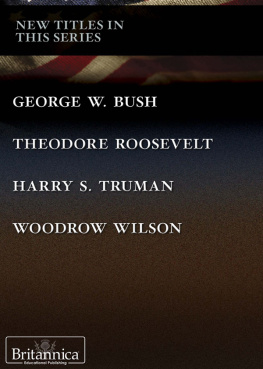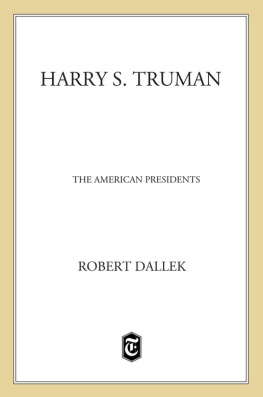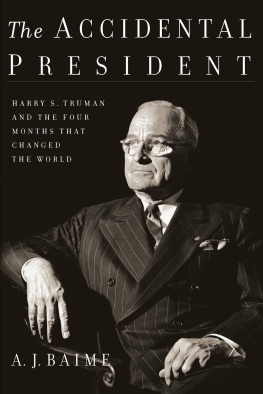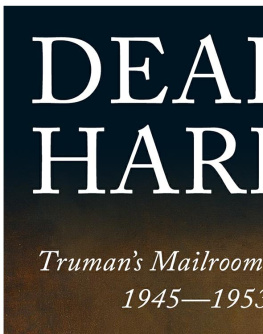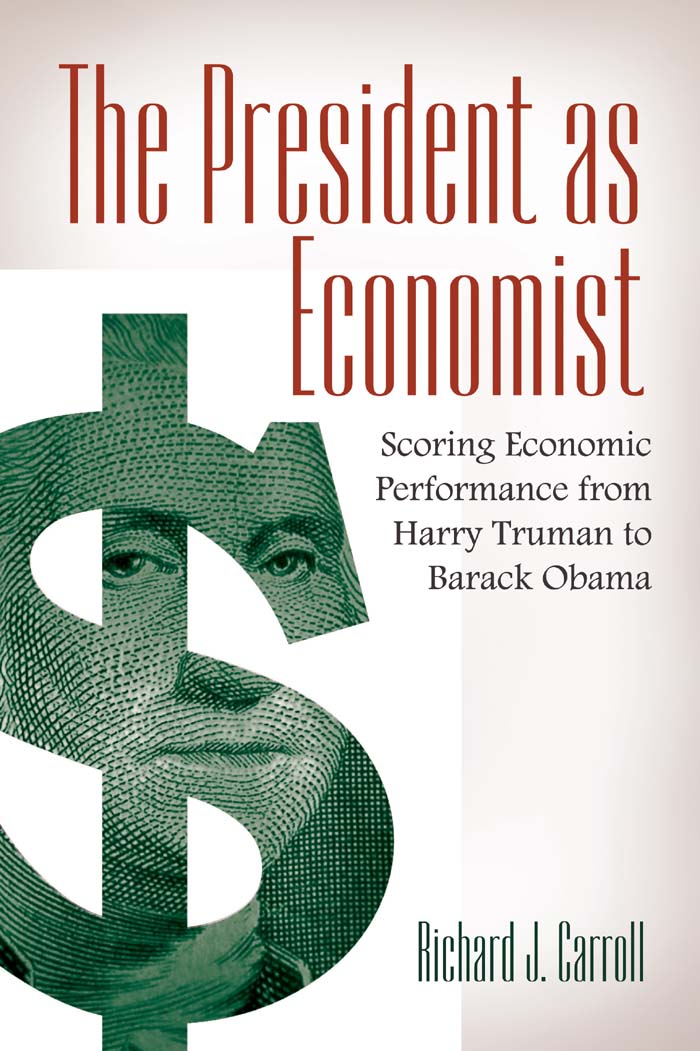Richard J. Carroll is an economist, evaluation specialist, and financial analyst who has published several books and articles about the U.S. economy that cover a range of issues focusing on lessons for current policy. He has extensive international economic experience including work with the World Bank and other international and bilateral organizations in more than 40 countries, providing economic and financial expertise for economic policies and international investment projects. He specializes in evaluating economic programs and investments. He holds a BA and MA in economics from Georgetown University, an MBA from the Wharton School, University of Pennsylvania, and was a Fulbright Scholar in Germany.
The President as Economist
Scoring Economic Performance from Harry Truman to Barack Obama
Richard J. Carroll

Copyright 2012 by Richard J. Carroll
All rights reserved. No part of this publication may be reproduced, stored in a retrieval system, or
transmitted, in any form or by any means, electronic, mechanical, photocopying, recording, or
otherwise, except for the inclusion of brief quotations in a review, without prior permission in
writing from the publisher.
Library of Congress Cataloging-in-Publication Data
Carroll, Richard J.
The president as economist : scoring economic performance from Harry Truman to Barack Obama / Richard J. Carroll.
p. cm.
Includes bibliographical references and index.
ISBN 9781440801815 (hard copy : alk. paper) ISBN 9781440801822 (ebook)
1. United States Economic policy. 2. United States Economic conditions. 3. Budget United States History. 4. Government spending policy United States History. 5. President United States History. I. Title.
HC103.C352012
330.973 dc23 2012009290
ISBN: 9781440801815
EISBN: 9781440801822
161514131212345
This book is also available on the World Wide Web as an eBook.
Visit www.abc-clio.com for details.
Praeger
An Imprint of ABC-CLIO, LLC
ABC-CLIO, LLC
130 Cremona Drive, P.O. Box 1911
Santa Barbara, California 93116-1911
This book is printed on acid-free paper
Manufactured in the United States of America
Contents
Figures and Tables
Figures
1.1 GDP Growth Rates, 19462010
2.1 Inflation (CPI), 19462010
2.2 Real Prime Interest Rates, 19462010
4.1 Dow Jones Industrial Averages, Not Adjusted for Inflation, 19462010
4.2 Dow Jones Industrial Averages, Adjusted for Inflation, 19462010
5.1 Unemployment Rate, 19462010
5.2 Percent of the Population below the Poverty Line, 19592010
6.1 U.S. Trade Balance as a Percentage of GDP, 19462010
7.1 Federal Budget as a Percentage of GDP, 19462011
7.2 Composition of Federal Outlays, 19462011
8.1 Federal Budget Deficits as a Percentage of Total Budget, 19462011
8.2 National Debt as a Percentage of GDP, 19462011
9.1 Federal Taxes as a Percentage of GDP, 19462011
9.2 Composition of Federal Taxes, 19462011
9.3 Pretax Share of Family Income
9.4 After-Tax Share of Family Income
10.1 Depiction of Presidential Performance Index: Base Case
Tables
I.1 Economic Indicators Used in the Analysis
1.1 GDP Growth Rates by Presidential Administration
1.2 Productivity Growth Rates by Presidential Administration
2.1 Inflation Rates by Presidential Administration
2.2 Real Prime Interest Rates by Presidential Administration
3.1 Investment Rates by Presidential Administration
3.2 Personal Savings Rates by Presidential Administration
4.1 Stock Market (DJIA) Growth Rates by Presidential Administration
5.1 Employment Growth Rates by Presidential Administration
5.2 Unemployment Rates by Presidential Administration
5.3 Percent of the Population below the Poverty Line by Presidential Administration
6.1 Exports Share of GDP by Presidential Administration
6.2 Trade Balance Share of GDP by Presidential Administration
7.1 Federal Budget Shares of GDP by Presidential Administration
7.2 Federal Budget Growth Rates by Presidential Administration
7.3 Federal Budget Shifts Pre- and Post2008 Financial Crisis
8.1 Deficits as a Share of the Federal Budget by Presidential Administration
8.2 National Debt as a Share of GDP by Presidential Administration
8.3 Trend in Federal Revenue and Deficits with the Financial Crisis ($ billion)
8.4 Trend in Federal Budget Revenue and Deficits without the Financial Crisis ($ billion)
9.1 Legislated Tax Changes by Ronald Reagan as of 1988 ($ billions)
9.2 Federal Revenue and Outlays under Reagan ($ billions)
9.3 Tax Revenue as a Share of GDP by Presidential Administration
10.1 Category Weights for Presidential Performance Indicators
10.2 Overall Rankings Based on Standard Deviations
10.3 Overall Rankings Based on Min-Max Method
10.4 Overall Rankings Based on Average Indicator Rankings, Not Weighted
Preface
If all the economists were laid end to end, they'd never reach a conclusion.
George Bernard Shaw
Economics is a lot like psychiatry; you can make things up and they often sound sensible. It is possible to critique an administrations economic policy without any knowledge of economics at all. The more ideological a person is, the easier it is to be an economist. And the risks are minimal. After all, its not as if something can go wrong if you dont know what youre doing in economic policy. Its not like flying an airplane or transplanting a kidney or building a bridge. Anybody can be an economist.
Maybe the reason people feel uninhibited about their economic opinions is that they see reputable economists disagreeing about how to solve economic problems. But it would be wrong to infer from this disagreement that the field of economics is illegitimate, that winging it is just as good as policy based on empirical facts, data, and theoretical underpinnings for economic behavior. Trained, experienced economists tend to know these things better than a noneconomist, just as an airline pilot tends to fly a plane better than a passenger.
But economic expertise can be corrupted by ideology. Look at the costly mistakes by the financial geniuses on Wall Street (e.g., AIG and Goldman Sachs) with their credit default swaps, at the Fed (e.g., Alan Greenspan) with their model of self-regulation, and at the Treasury (e.g., Henry Paulson) with their faith in the subprime mortgage market even after it began to collapse, which led to the 2008 financial crisis. Economics knowledge cannot overcome the corrupting influences of ideology and greed. Still, for the average person to contribute positively to the public debate, he or she has to have some basic idea what she is talking about, and this book will help in that regard more hard data and less ideology.
Economic data, if not steered by ideological motivations, are good at disinfecting economic policy from bad premises. Data define the record of economic policy performance, and that record carries lessons with it. But if one is an ideologue, then data will be used simply to support the ideology. I confess that I have little respect for ideologues. I marvel at how they throw away everything that is important to good policy. The context of the issue; the contributions of other disciplines like science, psychology, and history; and their very own maturity about life are all cast aside just to maintain their ideological approach to economics.


